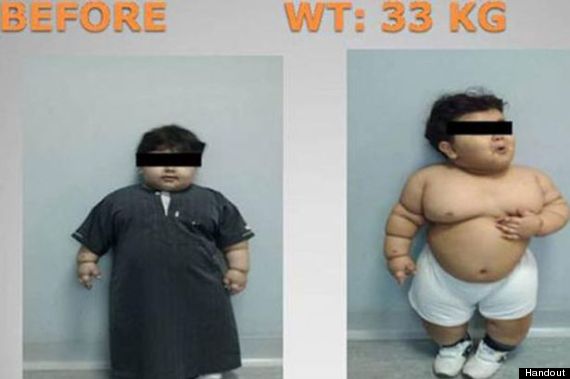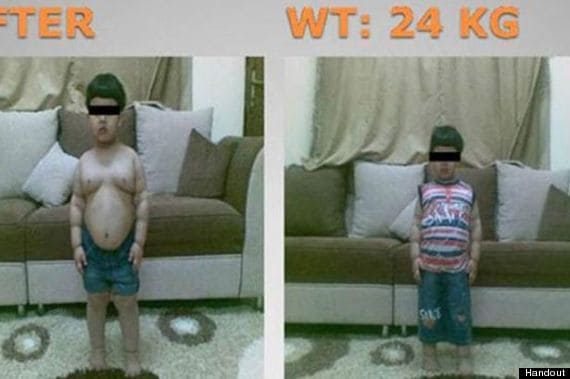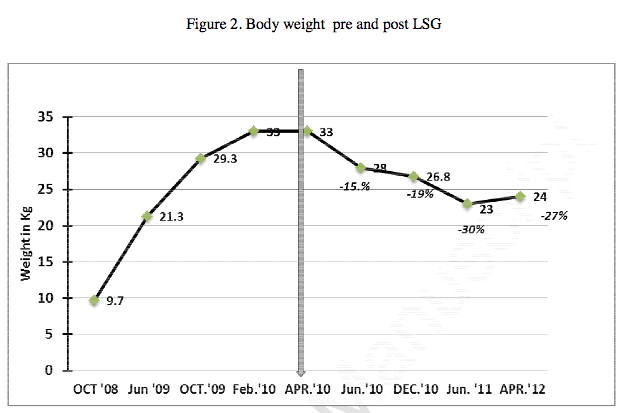I’m unable. Wholly unable:
A toddler in Saudi Arabia has become the youngest patient to undergo a bariatric weight loss surgery procedure.
Doctors determined the 2-year-old, weighing 73 pounds, required surgery after observing related sleep apnea and bowing of the child’s legs. According to a case report published in the International Journal of Surgery earlier this month, the extreme procedure was taken only after other weight-loss methods failed.
The study authors note that “full compliance” to diet and exercise by the boy’s parents cannot be verified, citing “different socio cultural habits and the absence of the practice of calculating the calorific value of the diet.”
The laparoscopic sleeve gastrectomy (LSG) was carried out in 2010 at the Prince Sultan Military Medical City in Riyadh. Unlike a “lap band,” which can be removed, LSG involves actually cutting and re-sizing the stomach itself, then stapling it shut.
Paul Zimmett, an obesity expert contacted by News Corp Australia, called the case “shocking” and “very unusual.”
“We have no idea what effect this may have on the child’s growth and unless he has proper follow up he may suffer vitamin deficiencies,” he added.
Within two months of the surgery, doctors reported a 15 percent decrease in the boy’s weight. After 24 months, the boy had reportedly lost 27 percent of his weight and was back to about 50 pounds.
In the United States, childhood obesity rates have doubled in the last 30 years, according to the Centers for Disease Control and Prevention. Childhood obesity is linked to increased incidents of cardiovascular disease, prediabetes and a slew of other physical and psychological ailments. [source]
That link in the article will take you to the full study, which is – depending on which way you look at it – either very promising or very bleak.
The child in the study suffered from obstructive sleep apnea, which – to put it simply, means the muscles in the throat and chest are incapable of protecting the throat itself from obstruction, where usually the obstruction itself is excess body fat. Obstructive sleep apnea is generally the most common form of apnea in the country right now, specifically due to the fact that the two – obesity and sleep apnea – can go hand in hand.
Sleep apnea is pretty simple – the obstruction in the throat prevents air from passing through to the lungs, which affects your ability to pass oxygen throughout your body. In short, you can basically stop breathing. This, of course, results in interrupted sleep, so a person with sleep apnea often finds themselves tired throughout the day even if they went to bed at a “decent” hour.
Let me be clear – sleep apnea isn’t reserved exclusively for the overweight and obese. Central sleep apnea, another form of sleep apnea, is less about obstruction and more about the chest cavity itself, and affects those obese and not. I’m only talking about what’s in front of me.
The study talks about the boy being 21lbs at 6mos of age, about 65lbs at 14mos old, and also notes that they “ruled out” hereditary and genetic conditions as contributing to the boy’s condition.
Y’all, I don’t know what to make of this.
Listen. I’m always happy when a child’s life is saved. And if this can change the prospects for children, then so be it.
But let’s not lie to ourselves – this isn’t a cheap procedure. Follow-up isn’t cheap. Assistance isn’t often an option. This study received no funding. What on Earth will become of families who couldn’t afford a procedure like this to save their children? Or are we expecting benevolent beings to determine whether or not children live? (Side note: so, about that affordable health care……)
I have so many questions that the study doesn’t answer – what could cause an infant to gain weight so rapidly, if we’re ruling out genetics and hereditary contributors? If we think the issue is food, as evidenced by the type of surgery they chose, then what kinds of diets did they try on the child? What worked, and what didn’t?
We could easily go on a tangent about childhood obesity and what or how often the parents are feeding him, but the reality is that this is an infant. There aren’t that many variations on the theme.
If you take a look at the chart of the child’s progress post-surgery, you can see that the child’s weight actually began to decrease post-surgery, but then went up closer to the publishing of this [unedited] version of the study (which was in April.) I’m curious – how much time should be used to consider whether or not a procedure is a success? We talk so much about how 5 years is – for some reason – the marker for weight loss success in people who simply do it through changing their lifestyles, but this study only covers two years. Why the rush?
There’s mention of sleep apnea being the only kind of ailment coupled with the obesity, but in his post-operation charts, his triglycerides (basically, the presence of fat in the blood, clogging up the arteries, can cause high blood pressure) have gone from “high” to “normal.” Does that imply that food contributed to
I am so weary of this. What kinds of food was the child eating before surgery, and did any of that change after surgery? What kind of measures did the family and doctors take to try to combat the rapid weight gain?
Talk to me, y’all – what do you think? How do you feel about these kinds of surgeries being performed on children? Do you think this is the future of sustainable weight management for kids?




15 comments
I honestly believe this should type of intervention should be reserved for children who has some sort of medical condition that has caused the weight gain. Working in a pediatricians office, I see too many 100 pound toddlers, in whom the doctor can find no other explanation for the weight….except over indulgence. I see these children sitting in the waiting room being fed cookies, chips, candy, sodas & “juice”, and then hear the parents tell the doctor, “It’s just baby fat,” or “I don’t know what to do, he/she just eats & eats.” I know it’s hard to say no to them, but seeing your toddler struggle to walk should give a parent pause when handing over sugary snacks.
If his diet is anything like Emiratis then I’m sure it’s candy, soda, and chips every day since he was born.
The idea of this child getting this surgery makes me sooooo sad on so many levels…… I would love to know what was the child eating, if maybe there was something going on with this body to make him gain weight, will they follow-up with this family, will they take the band off someday etc. Very, very sad!
Nah, this wasn’t even lap-band surgery – this was the kind where they re-size your stomach. This weird thing about this is that the stomach can, in fact, be stretched out AGAIN by overeating, which could possibly coincide with the weight gain he experienced at the end of the study’s review… which is… I don’t even know what to say, here. Kids grow, as would the size of his stomach and other vital organs, so….
I think the parents should have been arrested for abuse and the child put in foster care. This is a form of child abuse. I remember my neighbor who was a new mother overfed her child. All she did was reduce the portions he quickly lost the weight. To be this young and have surgery while he is still growing. It is proven this surgeries don’t work.
He is an infant. Feeding him vegetables after probably feeding him fast food, and a lot of sugar he will recover quickly.
The doctor should be brought up on charges.
Unfortunately I feel the court should be brought into this. They can assign nutritionist and help them to eat healthy. Just crazy. Feeding him healthy food would have made him lose weight quickly.
Surgery is trauma to the body. There is no reason to put a baby through this. They could have helped the sleep apnea while he gets on a reasonable diet. This child is still growing and need the nutrition. He is not going to get enough nutrition to help him develop fully. Plus all of the side effects from this type of surgery that adults are having a problem with. So upset.
“I think the parents should have been arrested for abuse and the child put in foster care.”
I feel like this – or the thinking that accompanies this – is never helpful. 🙁
I have to agree. Mostly. To let the child get to that point was abuse. At the VERY least, neglect. But I do think at that point surgery was probably the only option. Sleep apnea can be fatal. I think the family should be put on some sort of supervision for awhile, to make sure the parents have stopped endangering the child
I agree with Francesca. Weight loss surgery should not be an option for any child for which the issue is overindulgence. For many adults in TX, it’s not an option seeing as no insurance company (and I mean that in the most literal sense, our HR guy tried to find one for the company policy due to the number of obese employees) will cover the surgery. They will cover gym expenses, nutrition consults and weight loss medications but not the surgeries. Most people who do get it have to pay out of pocket.
I honestly just don’t understand fat children. When my niece, 11 now, started to get chubby my sister simply stopped buying candy and enrolled her in season appropriate sports. The weight came off and she had no idea she was on a diet. She wanted candy but after the word “no” was used often enough she stopped asking.
And my sister is on government assistance so I know it can be done. Granted, for the summer sports my sister had to exchange manual labor for my niece’s admission costs but she did it and it was “free”.
Wow
Joules, just about all of the major health insurance companies cover weight loss surgery in Texas, if the employer wants it on the policy. Myself and several friends have all had procedures performed in TX with different carriers over the past 1-5 years. Maybe the rates are not what the HR department wants to pay.
As for the case at hand…I cannot imagine how any physician approved this line of care for a 2 year old baby. I have had VSG and the aftermath was brutal mentally. Physically all was fine because I have an excellent surgeon but this child’s anatomy has been changed for life and he has no choice in the matter.. Speaking of surgeons, mine spoke at a seminar two weeks ago and mentioned this story. He was appalled because as he said, the child was not making his own nutritional decisions so someone else was responsible for feeding him and could have made better choices. It was very interesting to hear his perspective.
I’m only responding because you seemed to genuinely want responses. I was a normal kid up until 6 years of age. Around that age, I started gaining weight and gaining weight. It was crazy. There was no reason for it. I never ate snacks or soda. We just didn’t have that stuff in the house. We ate really basic foods and I was an outdoors always on my trampoline kind of kid. The docs couldn’t figure it out. It certainly wasn’t my parent’s fault. It just happened. Even up to high school it was like this. I could never lose weight. I was very active on the varsity basketball team, so I managed to not be incredibly obese but I was still fat. Can this be explained? Idk. I have PCOS. My whole family is fat on both sides. But back then I really, honestly ate so little especially compared to how much I exercised. Sometime bodies just suck.
I always genuinely want responses, even when they don’t fit whatever narrative my post might seemingly be crafting – it helps expand my worldview. I appreciate your share. 🙂
My 2 cents
1. The Middle Eastern Diet is comPOSED of sugar! I teach English to Libyans, and when they talk about their food preferences it makes me blanche. I think these (Mid East) guys have the highest rates of diabetes in the world. All of their comfort food is sweet, teas are sweet, and the guys’ eyes go glassy when they talk about their meat feasts.
2. The family undoubtedly has MONEY. These guys tend to have more money than common sense and drive EVERYwhere. In Abu Dhabi they’ll go shopping at the mall and leave the car engines running WITH the A/C on because it’s THAT hot, and the price of fuel is a non-issue.
Okay, three cents
3. Connected with the heat, the ubiquity of cars, the nom-freedom of women to move about without swathes-of-fabric-and-a-man, the age at which the girls get married and pop out kids, their limited education (the boys are usually pushed to higher education, but diet isn’t a pet subject), the status and non-voice of women in these countries… See where this is going? 😀
I have problems with this. If calorie restriction programs did not work, why would this be successful? Where does this child’s height and growth rate figure in? As he grows he has to stretch it out, a toddler micro tummy is not going to cut it for long. Will the staples then pose a danger? I think this was not a well thought out experiment and the parents thought this would be an easy fix.
Just to counter some of the racism and stereotypes that are going on here in the comments: I’m very familiar with Tunisian culture (which is very similar to Libyan), and they eat a much better diet than Americans do. Yes, their tea has a lot of sugar in it, and they eat a lot of sweets during Ramadan and on Eid (or when they have guests), but their everyday diets are much more whole-foods and vegetable-based than the standard American diet. (Although that is changing unfortunately with increasing westernization). Saudis have much worse diets, and very high rates of obesity, but that is a complex societal problem, relating to rapid industrialization and globalization of a previously simple society — it’s not something that can be easily reduced to cultural stereotypes about Arabs and Muslims.
Also, I would strongly advise people to not be knee-jerk judgmental of the parents. Anyone who was had an overweight child knows how difficult and complex the problem can be: it seems like no matter how healthy your food is or how much you encourage them to play outside, their weight just does not budge. Also, a *healthy* two-year-old would not be able to overeat to this extent: infants and toddlers are self-regulating, they do not need to count calories. Which is just to say that there is more going on here than “calories in, calories out”. There are very complex factors that lead to obesity, including hormonal factors, the microbes present in the digestive system, even the *mother’s* hormones early in pregnancy, which contributed to this child’s obesity. These complex factors were almost assuredly triggered by toxic modern diets, but that doesn’t mean it can be easily undone by a change in diet, once the train has left the station.
The fact is, obesity is still very poorly understood. Doctors cannot say categorically why this baby got so fat, because they don’t know. Nutritional science is still, really, in its infancy. For example, weight loss surgery like this cures diabetes to an extent that can’t be accounted for by the calorie restriction, and doctors don’t understand why. It causes some additional change in your body, above and beyond what the restriction in quantity of food consumed. And doctors don’t know what that change is.
The bottom line is, no doctor can promise that if you eat exactly this way, and move exactly that way, that you will reach a healthy weight and maintain it. Because in all of the scientific weight loss studies that have been done, they have not able to do that (even with support and under controlled conditions). Overall, weight loss studies show that the majority of people regain weight (their bodies actively fight them), and 2/3 end up heavier than when they started. And *that* is with professional support. I know there are success stories (like Erika), and it’s definitely not impossible, but you can’t condemn average people for being average. Especially in obesigenic societies like America and Saudi Arabia.
So lay off the poor kid’s parents. There is no guarantee that you could do any better, and I’m sure they just want what’s best for their son.
Comments are closed.